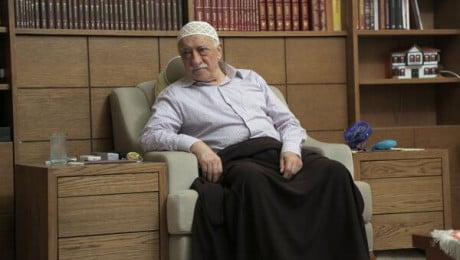Keyword: Fethullah Gulen

Gülen urges patience over prep schools row
Turkish Islamic scholar Fethullah Gülen expressed unhappiness over government [in Turkey] plans to abolish educational institutions that assist high school students to prepare for the national university admission examination and urged people to be patient in the face of this move, which is interpreted as a blow to education in the country.

The Hizmet Movement: Reflections from Sri Lanka
In Sri Lanka, the Hizmet Movement started the Learnium School as well as the Intercultural Dialogue Foundation. Initially, the funding for the school came from the Movement until it managed to support itself on its own income. Kimse Yok Mu was among the first to respond to the devastating tsunami that hit Sri Lanka. Large amounts of food and other requirements that the tsunami victims needed were supplied without any fanfare.

Hizmet movement rejects claim of forming political party
Hizmet says it is both practically and theoretically impossible to form a political party or to support a specific party, as it has volunteers from many different political ideologies. “This movement, which has no other goals than to serve humanity, would only advise its volunteers to form their political stances according to certain principles, like human rights, democracy, transparency, justice, pluralism, rule of law and freedom of expression and belief,” the statement said.

Fethullah Gülen donates $10,000 for victims of Typhoon Haiyan disaster in Philippines
Turkish Islamic scholar Fethullah Gülen donated to the Kimse Yok Mu foundation $10,000 for the victims of the Typhoon Haiyan disaster in the Philippines. “According to the United Nations Office for the Coordination of Humanitarian Affairs [UNOCHA], 4.3 million people have been affected by the typhoon and 330,000 people are now homeless. Ninety percent of the houses in Tacloban city have been damaged,” AFAD stated recently.

Turkish Islamic scholar Gülen decries domestic violence
Turkish Islamic scholar Fethullah Gülen had harsh words for the perpetrators of domestic violence, a bleeding wound in Turkish society that has worsened in recent years. [Domestic violence] incidents continued despite some promising steps Turkey has taken to address the issue of domestic violence, which has attracted more media attention and a greater reaction from the public in recent years.

Professor Wagner: With Gülen, the key is love
Today’s Zaman interviewed Wagner about his recent book and his insights about Fethullah Gülen. Prof. Walter Wagner says: “There was a Hitler, there was a Stalin, and there was an Osama bin Laden. We must be very careful and we must examine the heart. In Gülen’s case, the key is love. If the charismatic leader does not lead you to love, does not lead you to acceptance. People are hungry for such leadership.

Gülen among TIME magazine’s 100 most influential people
Turkish scholar Fethullah Gülen has made it onto Time magazine’s list of the 100 most influential people in the world. This is the 10th year the magazine has listed its 100 most influential people shaping the world. This year, the magazine put seven cover portraits of “TIME 100” honorees who it said reflect the “breadth […]

Hizmet Symposium: Academics Foster Peacebuilding Advocacy
Hizmet, or service, is one of the largest social movements in the world. The Rumi Forum organized an international symposium called the “Hizmet Movement and Peacebuilding for Global Cases” at the National Press Club Ballroom in Washington D.C. Academics and scientists from more than 20 countries presented topics covering the impact of Hizmet Movement to […]

Symposium concludes: Hizmet (Gulen) Movement Contributes to World Peace
Professors said that Hizmet is an anti-violence group that uses education and dialogue to achieve its goals. One of the highlights of the symposium was Dr. Martha Kirk’s presentation called Iraqi Women of Three Generations. There are 32 Hizmet schools in Iraq and she said these institutions teach Iraqi women self confidence.

Symposium concludes: Hizmet movement contributes to world peace
Professors said that Hizmet is an anti-violence group that uses education and dialogue to achieve its goals. Dr. Amidu Olalekan Sanni, Lagos State University, Nigeria: “I think the Hizmet group has been very influential in terms of human development, basically in the area of education and health. The first Hizmet university is actually based in the Nigerian capital of Abuja.”

Fethullah Gülen and the Hizmet Movement by Ori Soltes, Georgetown University
Ori Z. Soltes talks in this video about Fethullah Gülen from sufi perspective. Ori Z. Soltes is Goldman Professorial Lecturer at Georgetown Univeristy where he teaches theology, philosophy and art history at the department of theology and he is former Director and Curator of the B’nai B’rith Klutznick National Jewish Museum in Washington, D.C., where he curated over 80 exhibitions.

Embracing the World: Fethullah Gülen’s Thought and Its Relationship to Jalaluddin Rumi and Others
This is neither a comprehensive study of Fethullah Gülen nor is it a comprehensive study of Jalaluddin Rumi. What I am seeking to do is to explore the places where the thought of the one is echoed in the thinking of the other, either overtly or indirectly—and to note ways in which the opposite is true: that Gülen diverges from Rumi.

NEW BOOK: So That Others May Live: A Fethullah Gulen Reader
So That Others May Live offers a definitive compilation of Gülen’s characteristic essays. Some of them are available here in English for the first time. The rest have been carefully re-translated and edited, providing even familiar readers with new insight into Gülen’s most remarkable writings on faith, morality, education, civic service, and modern civilization.

The Gülen Movement: a modern expression of Turkish Islam – Interview with Hakan Yavuz
In a way, they [the Gülen movement] represent a new model of Islam in Turkey, at peace with democracy and modernity. This also reflects the Anatolian understanding of Islam, i.e. the Sufi conception of morality is at the centre of the movement. I would consider it as a movement based on the re-imagining of Islam and consisting of loose networks under the guidance and leadership of Fetullah Gülen.


















